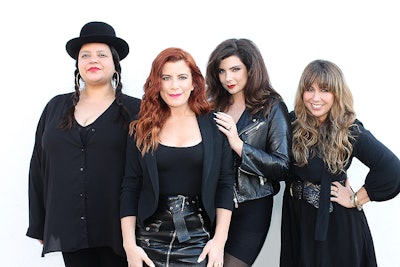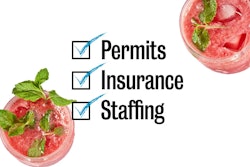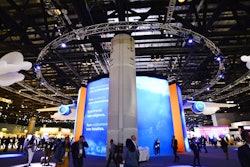
LOS ANGELES—In 2018, Teen Vogue interviewed 54 women at the Coachella Valley Music and Arts Festival—and every one of them recounted stories of being sexually harassed during the famous music festival. And the problem isn’t contained to Coachella (or even the United States): According to a 2018 survey from data analytics firm YouGov, 22 percent of music festival attendees in the U.K. experienced assault or harassment during the event.
As large-scale festivals continue to grow in popularity, a number of activists are searching for ways to combat the sexual misconduct that can come with them. One such group is Woman., a Los Angeles-based consulting agency that focuses on women’s empowerment and safety. Founded in 2017 by event pro Kate Mazzuca and popular local DJs Ana Calderon, Daisy O’Dell, and Michelle Pesce, the company was born from a casual conversation on the culture the DJs experienced while working nightclubs and events.
“Daisy O’Dell had organized a lunch between a few DJs, and the conversation turned to some of our jaw-dropping experiences in nightlife and events and how all the clubs and bars in L.A. seem to be run or owned by men,” explains Pesce, a former publicist who is now one of the city’s most recognizable event DJs. “It lit a fire within us to change that.” Soteria. worked with Goldenvoice to launch the inaugural Every One initiative at the Coachella and Stagecoach festivals in April.Photo: Courtesy of Woman.
Soteria. worked with Goldenvoice to launch the inaugural Every One initiative at the Coachella and Stagecoach festivals in April.Photo: Courtesy of Woman.
Adds Calderon: "I had been working as a promoter and resident DJ at a couple big nightclubs on the west side. ... Myself and the only other woman promoter would sit through these meetings and not only feel like our voices weren’t being heard when it came to basic event ideas, but even more so unheard when we questioned protocols and some of the more subversive natures of big city club promotions."
O’Dell connected the group of DJs to Mazzuca, the former longtime director of event marketing for Variety who now runs her own firm, Bespoke Bohéme. “This was pre-#MeToo and #TimesUp, but we had been having these offline conversations about the need for parity, safety, and inclusion in our fields of work and realized this was a larger issue than any one of us had imagined—and by coming together, we were able to address it," says Mazzuca.
As their consulting agency evolved, the women realized the need for a safe-space initiative designed specifically for music festivals and other large-scale cultural gatherings. Soteria., named for the Greek goddess of safety, salvation, and preservation from harm, officially launched in April. Eleuthera Lisch, a public safety expert who previously worked with the U.S. Justice Department, serves as executive director.
The goal is to provide physical spaces and on-site access to mental health counselors and trained safety ambassadors for anyone experiencing sexual misconduct or trauma at a festival. Last month, the group teamed up with Goldenvoice on the inaugural Every One activation, which debuted at this year’s editions of Coachella and Stagecoach.
Woman.’s founders spoke to BizBash about why Soteria. is such a crucial initiative, how their history of work in events and nightlife informed their goals, how the industry can more directly address sexual misconduct, and more.
How exactly did Soteria. come about, and why is it such a crucial initiative for festivals and other large gatherings?
Kate Mazzuca: We had been working on these “revolutionary” ideas that women should feel safe when they go out to have fun with their friends, and it just clicked that the places where this attention was needed most were large-scale events, festivals, and gatherings where you have this history of these unfortunate occurrences.
The most basic answer is that large-scale events and festivals can be stressful for people in and of themselves due to their size and scope, and we can help alleviate, or at the very least address, that. Additionally, when people come together in a celebratory nature—especially on a large scale—inhibitions are lowered and, unfortunately, that can oftentimes lead to unwanted events. Our initiative has a broad focus of supporting anyone in need of our services, regardless of gender, who is experiencing anxiety, trauma triggers, harassment, or assault.
Ana Calderon: I have been going to music festivals and concerts since I was a teenager ... First as a fan, then a music label boss, and eventually as an artist. I felt a personal need for a space like this, and would have been so much more comfortable going to festivals alone knowing these services existed.
Daisy O'Dell: We used our personal experience to inform the idea—what do we want to see improved? Then we hired experts to help us make this vision functional. ... Our spaces and Soteria. squads really enhance the attendee experience in addition to mitigating risk and harm reduction. To be able to train staff in our practices of inclusive and person-centered care and de-escalation techniques should be mandatory for every festival.
Michelle Pesce: We love music, we love community and gathering and being free—but when you don't feel safe, you can't be free. You can't truly put your guard down. And at a time when historically oppressed people are speaking up, being heard, and rewriting the rules, we are no longer OK with ignoring our discomfort in these situations. Stationed throughout the festivals, the Every One tents offered calming, comfortable spaces with access to mental health counselors.Photo: Courtesy of Woman.
Stationed throughout the festivals, the Every One tents offered calming, comfortable spaces with access to mental health counselors.Photo: Courtesy of Woman.
You are all longtime veterans of the event and hospitality industry, whether as producers or entertainers. How did that experience and knowledge help with the idea and implementation of Soteria.?
Calderon: Having worked in the music industry for so long, and because the nature of our work is very social, we have been able to amass a pretty magnificent roster of collaborators. All of our projects have been aligned with folks we met while doing our regular jobs (DJs, publicists, event producers, etcetera). The pitches and discussions were an easy sell because if you spend enough time working in the industry of entertainment, it’s pretty hard not to see all the problems in relation to inclusivity, equity, and safety.
Mazzuca: For me personally, I’ve been producing events within the entertainment industry for almost two decades. And while we oftentimes discuss guest experience, I’ve never sat at a table and discussed how to actually help guests who may be at risk. To be able to do something that touches on the better, more altruistic parts of one’s nature, while utilizing one’s talents and professional background, is pretty special.
And logistically—after years of producing, partnering, and working on every kind of event and activation under the sun—it certainly gives us a shorthand to build from the ground up quickly and to touch on all points from A to Z as it relates to guest experience, production, decor, staffing, and all of the “fun” stuff.
Pesce: Listen, we are DJs, music and event producers, marketing gurus, and artist bookers. We want to be clear about our backgrounds. We know a lot of the issues. We have access and resources that are far-reaching.
But we could not have created a comprehensive safe space activation with ambassador training and protocols without bringing in someone who has devoted their career towards this work. Our executive director of Soteria., Eleuthera Lisch, has been doing public safety, violence prevention, and gang intervention work for over 20 years. Together we are creating and implementing a modern safe space culture at these gatherings.
Some of your first major activations happened last month at Goldenvoice's popular Coachella and Stagecoach festivals. How did you work alongside the Every One initiative, Goldenvoice's new program to promote festival safety?
O'Dell: We are deeply honored that Goldenvoice put faith in us to co-create their inaugural initiative. A group of collaborators came together to take a critical look at two of the most influential festivals in the world and apply solutions (including Soteria.) to address some pervasive problems.
Mazzuca: We began conversations with the Goldenvoice team in the summer of 2018 after pitching the idea for the previous year’s festivals. They came back to us with safety and attendee care as larger components for the 2019 festivals, which would also have a greater focus on equality and inclusion. We laid out the Soteria. initiative—including physical production and design and our Safety Ambassador program and training—for them to fold into their programming. We collectively worked together and cherry-picked from there to co-create the program that ultimately became Every One.
Calderon: What happens at Coachella and [Goldenvoice's] other festivals is often reproduced all around the world. They are essentially the “tastemakers” of global festival culture. We hope that Coachella taking the much-needed step into providing these services and doing this work will embolden other festivals to fall in line. "Our initiative has a broad focus of supporting anyone in need of our services, regardless of gender, who is experiencing anxiety, trauma triggers, harassment, or assault," explains Mazzuca.Photo: Courtesy of Woman.
"Our initiative has a broad focus of supporting anyone in need of our services, regardless of gender, who is experiencing anxiety, trauma triggers, harassment, or assault," explains Mazzuca.Photo: Courtesy of Woman.
I know you plan to expand this initiative at future festivals, on campuses, and at large-scale corporate events. Can you share any specifics about future plans?
Calderon: We just finished Form Festival at Arcosanti in Arizona, and have been invited to come back in an expanded role for next year. We also hope to return to the other festivals we have activated at such as Summit, Coachella, and Stagecoach. We are in talks to finalize Soteria. activations at a few more major U.S. festivals, and also are in talks with a few major hotel chains and corporate brands to do everything from creating our self-care sanctuaries to doing company-wide safety training.
How can the live event industry as a whole get better about these issues of sexual misconduct and trauma?
Mazzuca: As we’ve seen with the festivals and groups who’ve already brought us on board or reached out for upcoming events, people are already paying far more attention to these issues than they did even a year ago. As they say, knowing is half the battle, and becoming better educated on what’s really going on in these spaces and then taking the time to address the issues is already a huge step. We talk a lot about how this comes from the top down, so as brands and agencies start paying more attention to how they are treating their own employees, and which vendors and sub-contractors they are hiring, the culture will start to shift.
In terms of attendees and guests, we have created a program that’s “plug and play” in the hopes that more people will start to see “care” as an integral part of the overall experience. We have hired the experts and have spent a lot of time and energy creating a simple and fairly easily implementable program.
O'Dell: It starts with all of us holding each other accountable. We can all be active bystanders. The second critical solution is training. Teaching the communities that operate these spaces appropriate language, sensitivity, and de-escalation techniques can truly shift the needle on an event.
Pesce: We are in the midst of a movement against sexual harassment and assault. The nightlife and festival industry must start with acknowledging that the problem exists and is a part of the culture. We must embrace a new way of compassionate care as many guests enter these spaces with unresolved trauma and anxiety, and bad behavior is still occurring sometimes as a result of that actual unresolved trauma.
I urge the industry to put resources into activations and organizations that are working on solutions. There are multiple ones out there. ... I hate to sound cliche, but what side of history will you be on?
Mazzuca: As we always say, you don't have to hire us. Just make sure you're doing something.



















